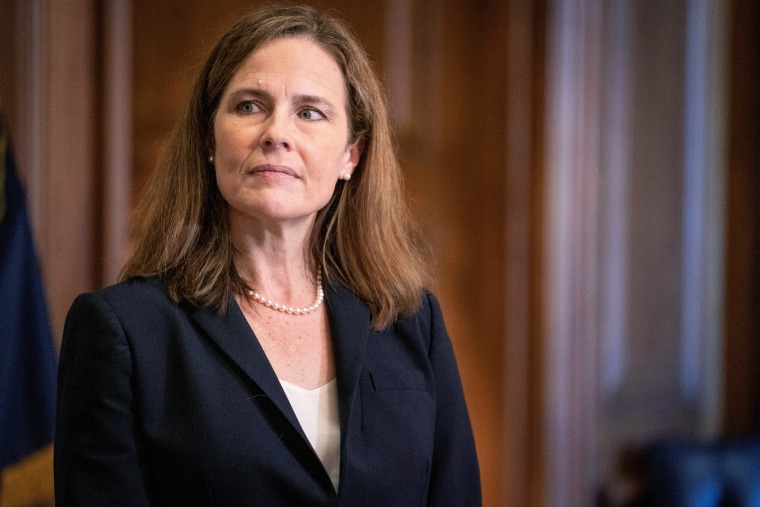WASHINGTON — The Republican-led Senate voted narrowly Monday to confirm Amy Coney Barrett to the Supreme Court, ending an acrimonious confirmation process and handing President Donald Trump a political victory days before the election.
Barrett, 48, a federal appeals judge, will fill the seat left vacant by Justice Ruth Bader Ginsburg, the liberal icon who died Sept. 18, and Barrett is expected to propel a sharp ideological turn on the court. Democrats made numerous unsuccessful attempts to slow or derail the vote but ran headlong into a Republican Party determined to cement a 6-3 majority.
Some legal experts say it will be the most conservative Supreme Court since before World War II. The addition of Barrett could solidify the right’s advantages on issues like campaign finance and gun rights while threatening progressive issues like abortion rights, voting rights and health care regulations.
The vote was 52-48, with only Republicans voting “yes” and Democrats unifying in opposition. Just one Republican, Sen. Susan Collins of Maine, who faces a tough re-election race, voted “no.”
After the presiding officer, Sen. Chuck Grassley, R-Iowa, called the vote, a round of applause broke out in the chamber as Republican senators bumped fists to celebrate.
Barrett, who was confirmed 30 days after Trump announced her nomination, is the first nominee in the modern era to be confirmed with no votes from the opposition party.
Barrett's nomination drew enthusiasm from Republicans, who have made the courts their priority in the Senate, and anger from Democrats, who warned them not to fill a vacancy in an election year, particularly after GOP leaders refused to do so under a Democratic president in 2016.
The White House held a swearing-in ceremony Monday night where Barrett's official constitutional oath was administered by Justice Clarence Thomas, the most conservative member of the court.
Chief Justice John Roberts will administer the judicial oath in a private ceremony Tuesday, officially making Barrett a justice.
At Monday night's ceremony, Trump noted that she is the fifth woman to sit to the high court.
“This is a momentous day for America, the United States Constitution and for the fair and impartial rule of law,” Trump said. “Justice Barrett made clear she will issue rulings based solely upon a faithful reading of the law and the Constitution as written not legislate from the bench."
He later added: “The Barrett family has captured America's heart. It is highly fitting that Justice Barrett fills the seat of a true pioneer for women, Justice Ruth Bader Ginsburg.”
In her brief speech, Barrett promised to rule from the bench with strict independence.
“It is the job of a senator to pursue her policy preferences. In fact, it would be a dereliction of duty for her to put policy goals aside. By contrast, it is the job of a judge to resist her policy preferences. It would be a dereliction of duty for her to give into them,” she said.
“A judge declares independence not only from Congress and the president but also from the private beliefs that might otherwise move her.”
Sen. Lisa Murkowski, R-Alaska, reversed course over the weekend and said she would vote in favor of confirming Barrett even though she opposed filling the vacancy near an election.
Sen. Joe Manchin, D-W.Va., who voted for Trump’s two other Supreme Court nominees, lamented the “degradation of Senate norms and procedures” in an op-ed explaining his opposition to Barrett's confirmation and its “unprecedented” nature.
Barrett could quickly begin to play a pivotal role on the court. She cannot vote on cases that have already been heard, but after being sat she could help decide applications from states for the court to settle disputes about voting methods.
The court has already decided on applications in several election-related disputes, largely siding with Republicans on issues like curbside voting in Alabama and witness requirements in South Carolina.
"This is one of the brilliant, admired and well-qualified nominees in our lifetime," Senate Majority Leader Mitch McConnell, R-Ky., said before the vote, adding that Barrett will be the only current justice confirmed with a law degree from “any school not named Harvard or Yale.”
Senate Minority Leader Chuck Schumer, D-N.Y., said that “the Republican majority is lighting its credibility on fire.”
“You will never, ever get your credibility back,” Schumer said before the vote. “And the next time the American people give Democrats a majority in this chamber, you will have forfeited your right to tell us how to run that majority. ... You walk a perilous road. I know you think this will eventually blow over. But you're wrong. The American people will never forget this blatant act of bad faith.”
Democrats haven’t decided how to respond if they win the White House and Congress, as presidential nominee Joe Biden reiterated Monday that he has “made no judgment” on proposals to add seats to the court, called court packing, and will set up a bipartisan commission of experts to propose ways to depoliticize the courts.
Following the confirmation vote, Biden released a lengthy statement in which he called for people to turn out and vote.
"Vote to protect the fundamental idea that health care is a right, not a privilege. And vote for the legacy of the late Justice Ruth Bader Ginsburg," Biden said.
Vice President Mike Pence canceled plans to preside over the vote after five people in his office tested positive for Covid-19.
Democrats have warned that Barrett’s confirmation could lead to the end of the Affordable Care Act, with the Supreme Court hearing oral arguments Nov. 10 in a case challenging the health care law.
They also argue that she would vote in favor of overturning the landmark 1973 Roe v. Wade decision, which made abortion legal nationwide.



